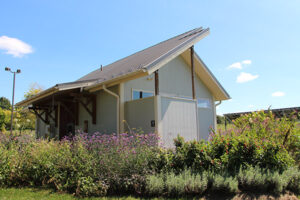The Water Purification Eco-Center at Rodale Institute
By Amy Nelson
 Nestled in the rolling, bucolic hills of Pennsylvania, Rodale Institute is a nonprofit organization dedicated to the advancement of organic farming through research and education. Up to 20,000 people flock to Rodale Institute each year to stroll through its 333-acre demonstration farm, conduct research, and participate in its many events, festivals, and workshops.
Nestled in the rolling, bucolic hills of Pennsylvania, Rodale Institute is a nonprofit organization dedicated to the advancement of organic farming through research and education. Up to 20,000 people flock to Rodale Institute each year to stroll through its 333-acre demonstration farm, conduct research, and participate in its many events, festivals, and workshops.
When the Institute began creating a new visitor center in 2010, they sought a wastewater treatment system that made sense for an organization devoted to strengthening the link between healthy soil, food and people. Around that same time, the US Environmental Protection Agency (EPA], which had produced a 1997 landmark report on the water quality and public health merits of decentralized wastewater treatment, sought opportunities to demonstrate innovate on site wastewater management systems to showcase what was possible. Thanks to an EPA grant and the nonprofit’s progressive leadership, Rodale Institute now has its own “Water Purification Eco-Center,” a system that harvests rainwater from the new visitor center’s roof to flush toilets and then treats that wastewater with a constructed wetland so it can be used to irrigate the site’s lush, native landscaping.
We, too, like to showcase what is possible. While it can be helpful to hear from an onsite wastewater treatment/reuse system’s designers-which in this case was Biohabitats-no one knows its impact and effectiveness better than Rodale Institute Executive Director, Jeff Moyer, who lives with it every day.
How does the Water Purification Eco-Center work?
(Video courtesy of Rodale Institute)
How can I learn more about Rodale Institute and the Water Purification Eco-Center?
When the Institute began creating a new visitor center in 2010, they sought a wastewater treatment system that made sense for an organization devoted to strengthening the link between healthy soil, food and people. Around that same time, the US Environmental Protection Agency (EPA], which had produced a 1997 landmark report on the water quality and public health merits of decentralized wastewater treatment, sought opportunities to demonstrate innovate on site wastewater management systems to showcase what was possible. Thanks to an EPA grant and the nonprofit’s progressive leadership, Rodale Institute now has its own “Water Purification Eco-Center,” a system that harvests rainwater from the new visitor center’s roof to flush toilets and then treats that wastewater with a constructed wetland so it can be used to irrigate the site’s lush, native landscaping.
We, too, like to showcase what is possible. While it can be helpful to hear from an onsite wastewater treatment/reuse system’s designers-which in this case was Biohabitats-no one knows its impact and effectiveness better than Rodale Institute Executive Director, Jeff Moyer, who lives with it every day. (See video)
